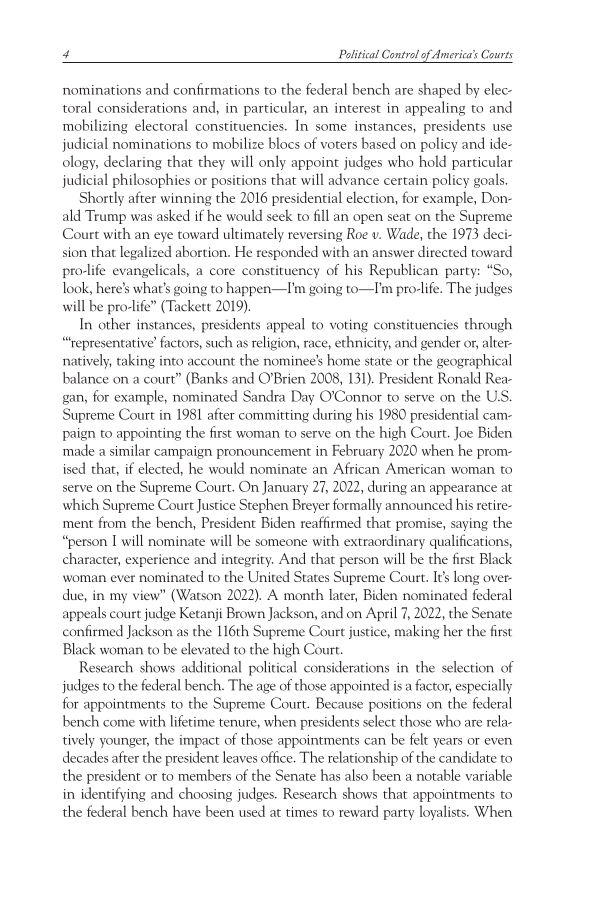4 Political Control of America’s Courts nominations and confirmations to the federal bench are shaped by elec- toral considerations and, in particular, an interest in appealing to and mobilizing electoral constituencies. In some instances, presidents use judicial nominations to mobilize blocs of voters based on policy and ide- ology, declaring that they will only appoint judges who hold particular judicial philosophies or positions that will advance certain policy goals. Shortly after winning the 2016 presidential election, for example, Don- ald Trump was asked if he would seek to fill an open seat on the Supreme Court with an eye toward ultimately reversing Roe v. Wade, the 1973 deci- sion that legalized abortion. He responded with an answer directed toward pro-life evangelicals, a core constituency of his Republican party: “So, look, here’s what’s going to happen—I’m going to—I’m pro-life. The judges will be pro-life” (Tackett 2019). In other instances, presidents appeal to voting constituencies through “‘representative’ factors, such as religion, race, ethnicity, and gender or, alter- natively, taking into account the nominee’s home state or the geographical balance on a court” (Banks and O’Brien 2008, 131). President Ronald Rea- gan, for example, nominated Sandra Day O’Connor to serve on the U.S. Supreme Court in 1981 after committing during his 1980 presidential cam- paign to appointing the first woman to serve on the high Court. Joe Biden made a similar campaign pronouncement in February 2020 when he prom- ised that, if elected, he would nominate an African American woman to serve on the Supreme Court. On January 27, 2022, during an appearance at which Supreme Court Justice Stephen Breyer formally announced his retire- ment from the bench, President Biden reaffirmed that promise, saying the “person I will nominate will be someone with extraordinary qualifications, character, experience and integrity. And that person will be the first Black woman ever nominated to the United States Supreme Court. It’s long over- due, in my view” (Watson 2022). A month later, Biden nominated federal appeals court judge Ketanji Brown Jackson, and on April 7, 2022, the Senate confirmed Jackson as the 116th Supreme Court justice, making her the first Black woman to be elevated to the high Court. Research shows additional political considerations in the selection of judges to the federal bench. The age of those appointed is a factor, especially for appointments to the Supreme Court. Because positions on the federal bench come with lifetime tenure, when presidents select those who are rela- tively younger, the impact of those appointments can be felt years or even decades after the president leaves office. The relationship of the candidate to the president or to members of the Senate has also been a notable variable in identifying and choosing judges. Research shows that appointments to the federal bench have been used at times to reward party loyalists. When
Document Details My Account Print multiple pages
Print
You have printed 0 times in the last 24 hours.
Your print count will reset on at .
You may print 0 more time(s) before then.
You may print a maximum of 0 pages at a time.

































































































































































































































